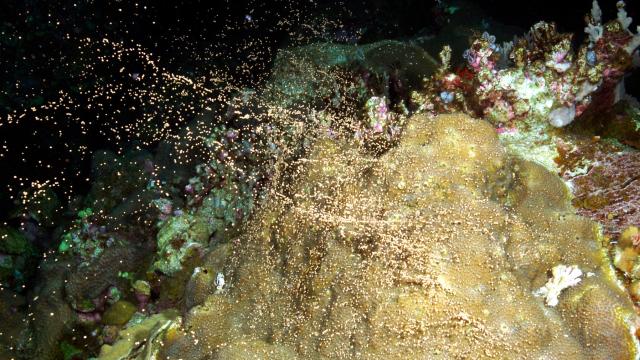Climate change may be messing with corals’ ability to reproduce, threatening them with extinction, according to a new study.
Published in Science on Friday, the new paper sheds light on the ways climate change may be disrupting coral spawning, an extraordinary event where corals release egg and sperm into nearby waters, relying on chance encounters for the sperm fertilise the eggs and form new corals.
I’ve witnessed coral spawning, and there’s something miraculous about it. This process has generally always worked for corals, but the study authors found that corals in the Gulf of Eilat in the Red Sea are seeing this usual synchronised event go “out of tune,” as stated in the study.
You see, coral spawning usually follows Earth’s natural cycles. Earlier studies from the 1980s had recorded spawning cycles in line with lunar phases. Between 2015 and 2018, however, the study authors found that five coral species in the Red Sea didn’t follow the patterns of the moon, sea temperatures, or wind. Instead, the spawning was “irregular,” according to the study. Regardless of lunar phases, corals were spawning multiple times a season with no consistency over the years studied.
Of the five species studied, some spawned during different moon phases from year-to-year while others spawned daily for weeks or months on end with far less vigour than the usual explosion of synchronised spawning on a single night. The difference between the species isn’t the issue, but rather that taken together, it shows something got out of whack that couldn’t be explained by local changes alone.
“Coral spawning, often described as “˜the greatest orgy in the world,’ is one of the greatest examples of synchronised phenomena in nature,” said author Yossi Loya, a professor at Tel Aviv University, in a press release. “Since both the eggs and the sperm of corals can persist only a few hours in the water, the timing of this event is critical.”
The study authors performed more than 200 field surveys on summer nights over four years to observe this spawning event. They aren’t certain, but they believe temperature change could be a driver of this changing behaviour because these waters have seen temperatures rise of 0.31 degree Celsius a decade since 1982. There’s also the potential for hormone pollutants to be messing with these cycles.
What is certain is the impact. Fewer baby corals are forming. That’s an indication of reproductive failure, which keeps populations from growing. So far, there’s no apparent coral decline, but the older, larger corals were dominant, highlighting the risk of longer term population decline.
“Regardless of the exact cause leading to these declines in spawning synchrony, our findings serve as a timely wake-up call to start considering these subtler challenges to coral survival, which are very likely also impacting additional species in other regions,” author Tom Shlesinger, a Ph.D candidate at the university, said in a release.
Climate change isn’t only messing with coral reproductive cycles. The global warming that comes with climate change is killing corals by another threat to corals.
And of course, there’s plastic pollution, human faeces and ships.
The least corals can do in this mad world is reproduce. We had to go and mess that up, too. Sigh.
